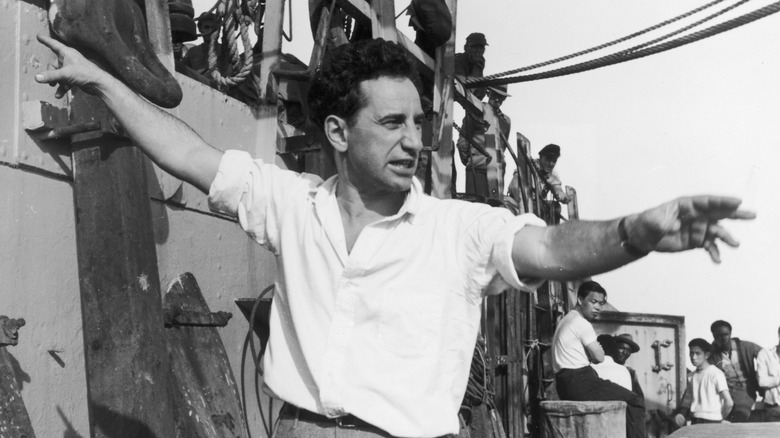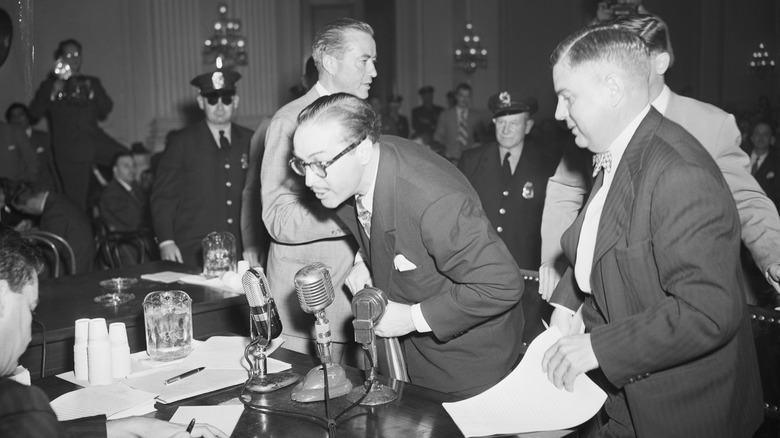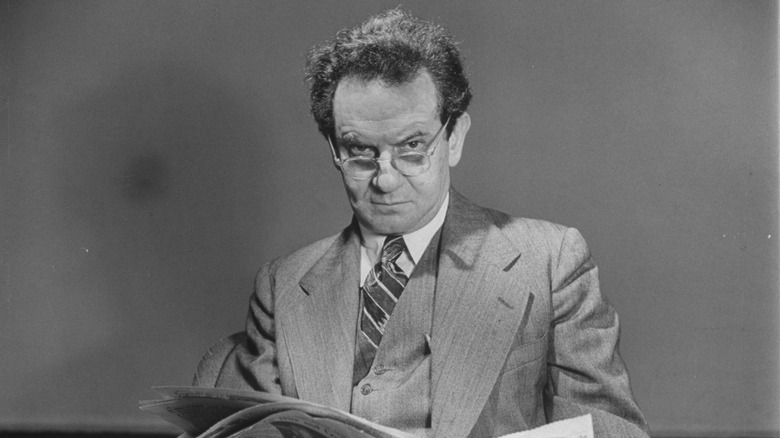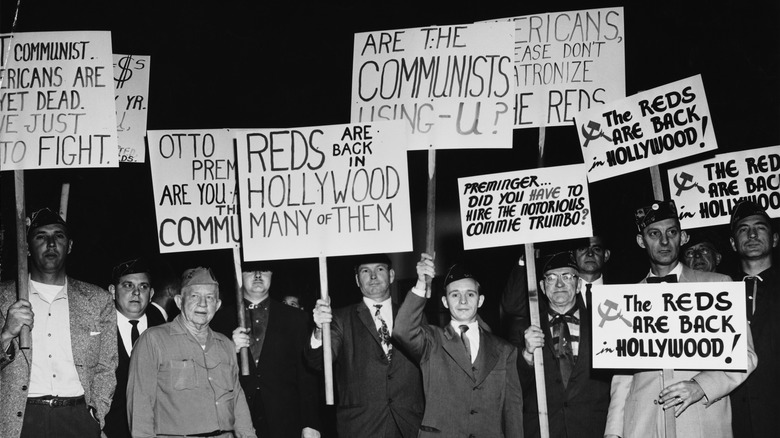What Was The Hollywood Blacklist And How Did It Hurt The Film Industry?
Let's get this out of the way: explaining the full history of the Hollywood Blacklist would take ages. In the simplest of terms, the Hollywood Blacklist is this: in the 1950s, several members of the Hollywood elite became targeted by the United States government over suspected ties to the Communist Party. This rabid search for Communists came from Joseph McCarthy, whose relentless attempts to weed out Communists (or allies of said party) were cruel. Targets were arrested, sent to prison, barred from participating in the entertainment industry ... and worse.
But how did it happen? In 1947, the Blacklist kicked off its reign of fearmongering by utilizing the House Un-American Activities Committee's (HUAC) power and influence to target a group of screenwriters and directors known as the "Hollywood Ten." That group included Alvah Bessie, Herbert Biberman, Lester Cole, Edward Dmytryk, Ring Lardner Jr., John Howard Lawson, Albert Maltz, Samuel Ornitz, Adrian Scott, and Dalton Trumbo. (Remember that final name; we'll return to him later.)
So, what happened to these ten creators? Well, they were subpoenaed to appear in front of HUAC. When they resisted, they were then arrested and charged with criminal contempt of Congress. All were subsequently fired from their various jobs in Hollywood. From there, things became dire.
The HUAC targeted prominent Hollywood creators — leading some to turn on colleagues
Soon, even those who didn't have direct ties to the Communist Party and agreed to testify in front of the HUAC became blacklisted from the industry. Of course, this atmosphere led others to gladly name names, resulting in their colleagues being blacklisted. Elia Kazan, Walt Disney, and the future United States President Ronald Reagan (he was an actor first, after all) testified before the HUAC and jeopardized others' safety. Despite efforts by a group named the Committee for the First Amendment — which listed Lucille Ball, Humphrey Bogart, Gene Kelly, Lauren Bacall, Frank Sinatra, Billy Wilder, and Judy Garland among its members — many careers were sidetracked and even ruined by the HUAC's efforts to weed out Communism.
As quoted in Eric Bentley's book "Thirty Years of Treason: Excerpts from Hearings Before the House Committee on UnAmerican Activities 1938–1968," actor Larry Parks agreed to testify, but spoke out against the injustices of the process. "Don't present me with the choice of either being in contempt of this committee and going to jail or forcing me to really crawl through the mud to be an informer," he reportedly said. "For what purpose? I don't think it is a choice at all. I don't think this is really sportsmanlike. I don't think this is American. I don't think this is American justice."
The after-effects of the Hollywood blacklist were especially dark
The negative effects of the Hollywood blacklist extended well beyond the destruction of careers (though that can't be overlooked). Sadly, several stars lost their lives, according to a commemorative essay about the 75th anniversary of this dark period in Hollywood over at TCM. Perhaps the most devastating outcome was the suicide of Philip Loeb, star of television's "The Goldbergs," who was reportedly miserable after being blacklisted. He died in 1955 in New York's Taft Hotel after overdosing on sleeping pills.
Other blacklisted actors are thought to have succumbed to the stress of the blacklist in different ways. Blacklisted actor John Garfield was only 39 years old when he died of a heart attack in 1952. In a 2017 New York Times opinion column, Garfield's daughter Julie wrote of her father's passing, "My father died of a heart attack. But we were all convinced that it was the witch hunt of the House committee that had killed him." A former co-star of Garfield's, Canada Lee, was also blacklisted and also died of a heart attack in 1952 — he was only 45 years old at the time.
A 2004 Los Angeles Times piece on blacklisted director Jules Dassin refers to him as "the only big blacklisted Hollywood director who's still alive" (Dassin later died in 2008). Dassin himself described the experience of seeing industry peers after being blacklisted by saying "[they] looked down at their toes as if a bug was crawling somewhere, or they would hide their faces."
If you or someone you know is struggling or in crisis, help is available. Call or text 988 or chat 988lifeline.org
So why is this still relevant today?
Perhaps the most disturbing aspect of these events is the industry's willingness to expel their own — despite murky allegations of Communist ties or evidence of how those beliefs cause violence or danger. Now, the Hollywood Blacklist is regarded as one of the darkest moments in the entertainment industry. Yes, some legacies were restored, but vindication came too late. Remember Dalton Trumbo? In 2011, sixty years after the fact — and decades after Trumbo's death in 1976 — he received the credit he deserved. Trumbo earned an Oscar for writing the critically acclaimed "Roman Holiday," released in 1953. Later, he was later memorialized in the 2015 film "Trumbo," which earned Bryan Cranston an Academy Award nomination for portraying the screenwriter.
Still, vestiges of the Blacklist remain. Major Hollywood studios are still hesitant to comment on egregious human rights violations for fear of alienating global audiences. Though Disney condemned homophobic laws passed by Florida Governor Ron DeSantis, it took the company some time to speak up. Recently, Hollywood has been targeting creatives who express solidarity with Palestine during the ongoing conflict in Gaza. Melissa Barrera was fired from "Scream 7" over comments deemed anti-Semitic by the film's studio. Notably, Tom Cruise went to bat for his agent, Maha Dakhil, after she voiced support for Palestinian citizens. Hopefully, Hollywood will remember the horrible effects of its Blacklist tendency to oust creatives based on whether or not they shared the same political, religious, or personal beliefs.



